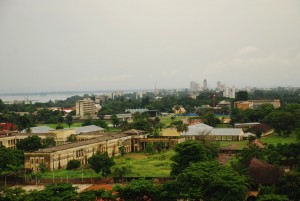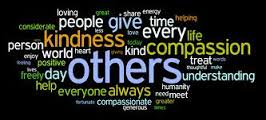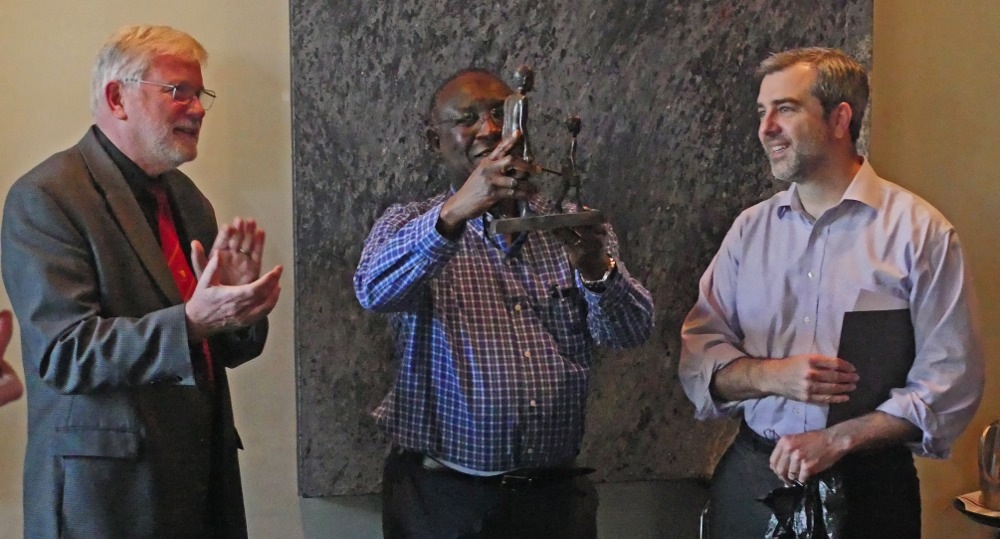Bringing Compassion Home
A Conversation with Tony Ukety
Former Non-Governmental Development Organization Coordinator for Onchocerciasis Control at the World Health Organization
David: Tony, so good to be with you today. Thanks for your willingness to share your story about the role that compassion has played in your life. I understand that you are at a transition point in your life now…
Tony: Yes. I’m calling it the third chapter.
David: What were the first two chapters?
Tony: The first chapter was my training, and the second chapter was my official career life. This third chapter is what I offer next.
David: Tell me about your training and how you became an ophthalmologist.
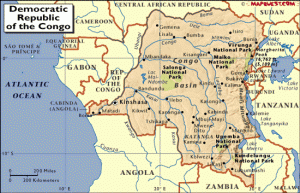 Tony: Well, I became an ophthalmologist because I strongly believed that God was calling me to that profession. When I started high school, I fell in love with electricity. My dad was a mechanic and I wanted to become an engineer or an electrician. Fortunately, according to my view, things didn’t work that way. I ended up paying attention to what I consider God’s call for me.
Tony: Well, I became an ophthalmologist because I strongly believed that God was calling me to that profession. When I started high school, I fell in love with electricity. My dad was a mechanic and I wanted to become an engineer or an electrician. Fortunately, according to my view, things didn’t work that way. I ended up paying attention to what I consider God’s call for me.
I heard this call in 1972 or ’73 when I was about to finish high school in the Congo. At that time we didn’t have enough medical doctors. It was a privilege to see a doctor and medical attention was not available to everybody. I attended a church school, which was one of the few schools in the area. The teachers were actually missionaries.
That year, the school had the privilege of a visit from a missionary medical doctor who was touring. He came to the school, and the Congolese school nurse screened us before we saw the doctor. We were there in the waiting room. The admission table was there, the nurse was there, and the doctor was in the other room. I was waiting for my turn and the nurse asked the question that I still remember today. He said, “I’m not sure that all of you are going to be seen by the doctor because he has to go to another school. Why don’t some of you go to medical school in order to address the huge challenge we have of not enough doctors?”
 For someone like me who was dreaming of becoming an electrician, or an engineer, medical school was not appealing. I thought to myself, “I think he has a point, but that’s not for me. One, I cannot handle seeing a dead person, and two, the smell of the hospital, that’s not for me.” But what he said started working in my head. Having missionary teachers was a privilege because in addition to regular, formal teaching they used to invite the students to their homes to interact with them, to get to know them better, and to have a meal in the evening.
For someone like me who was dreaming of becoming an electrician, or an engineer, medical school was not appealing. I thought to myself, “I think he has a point, but that’s not for me. One, I cannot handle seeing a dead person, and two, the smell of the hospital, that’s not for me.” But what he said started working in my head. Having missionary teachers was a privilege because in addition to regular, formal teaching they used to invite the students to their homes to interact with them, to get to know them better, and to have a meal in the evening.
My biology teacher once invited me and my best friend to dinner. She asked, “What’s the plan? In two years you are going to be finished school, and then what are you going to do?” I explained that I would like to be an engineer, but also that a few weeks ago I was puzzled by the challenge put to us by the nurse. I was now wondering whether I should go to medical school. She just said, “Yes, Tony, I think you would be a very nice medical doctor.” So that was it, and from there I really started praying for it.
David: It’s remarkable how your school nurse’s passing remark and an encouraging comment from your biology teacher set you on your path. What happened next?
Tony: In the Congo, when you are in the last year of high school, you have to take what we call the state exam. You have to declare what you want to do when you finish high school – assuming you pass the exam. That was a very difficult time for me, making that final choice. I did pray. I remember I said, “God, you know I really want to be an electrician, but it seems that you want me to be a medical doctor. If that’s your will, I’m putting it first choice, but you know I would really like to be an electrician.” So I put engineering as my second choice. Every student gets three choices. All the tests were related to the choices, and I scored very well.
I completed all the conditions to graduate and I passed the state exam. I received my high school diploma. Surprisingly, I was also admitted to medical school in Kinshasa, which was located 2,000 kilometers away from the village. It was very difficult to get to Kinshasa. I stopped halfway there, in Kisangani, because I didn’t know how to get to Kinshasa. It was not easy. I ended up reaching Kinshasa one week later on the 9th of November, 1974, and this is when I started my first year of medical school.
David: So you attended medical school in Kinshasa. How did you decide to specialize in ophthalmology?
Tony: Six or seven years later, I finished medical school and either had to work as a general doctor or do a residency. To get accepted into a residency program, you need a grade point average of 70% or above. If it’s lower than that you cannot be admitted. I scored high, so there was an open door for me to enter residency training.
The hospital back home was a church hospital started by a missionary doctor, Carl Becker, from the United States. It was the most famous hospital in the area. When I was in medical school, I used to come back home on vacation and visit the hospital. They were waiting for me when I finished medical school, but I also had the option of residency training. My challenge was: which one to choose? I wanted to be a gynecologist and make a lot of money. My second choice was surgery. Then the Dean of the medical school announced that during that year, they were not going to accept any of us for clinical specialization… so those doors were closed. Many closed doors. Instead, the Dean wanted students to go into basic science, because the medical school needed people for anatomy, physiology, chemistry, skills like that. I said, “No, I didn’t come to Kinshasa for this. I came to Kinshasa in order to address the needs back home.” But that door also was closed, so I was forced into the anatomy department.
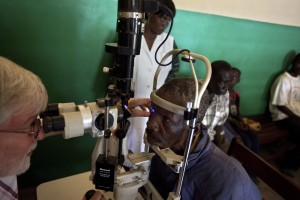 After a few weeks, I met the head of the ophthalmology department, Prof. Karel Maertens, in a corridor of the teaching hospital. He had been the pioneer in developing ophthalmology in Kinshasa since 1959. He asked if I might like to study ophthalmology. I said “Yes, because with ophthalmology I can at least go back home and help people.” With anatomy, I would have had to remain in Kinshasa teaching. So he opened the door for me and he convinced the Dean to let me transfer to ophthalmology.
After a few weeks, I met the head of the ophthalmology department, Prof. Karel Maertens, in a corridor of the teaching hospital. He had been the pioneer in developing ophthalmology in Kinshasa since 1959. He asked if I might like to study ophthalmology. I said “Yes, because with ophthalmology I can at least go back home and help people.” With anatomy, I would have had to remain in Kinshasa teaching. So he opened the door for me and he convinced the Dean to let me transfer to ophthalmology.
David: It does not sound like you followed a straight path to find your chosen specialty of ophthalmology. How did you end up becoming an expert in river blindness, or onchocerciasis?
Tony: Well, four years later I finished my residency, and then the time came for me to return home, in January, 1987. God worked in his own way, and I finally ended up at the Nyankunde hospital in Ituri province. I was in a rural area, but I had enough support from an international NGO to do my work. I felt very privileged – I could not envy anybody in Kinshasa! I had a vision. I said, “OK, I’m based here at a referral hospital, what can I accomplish?” The first two years I visited a lot of hospitals and clinics across that part of Africa to understand what the needs were for eye care.
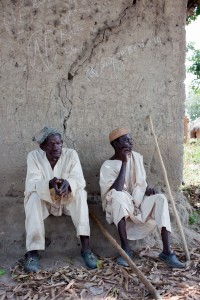 After eighteen months, I had traveled and visited all the big hospitals in northeastern DRC and I had enough data to present a picture of the major blinding diseases in my area. I presented my findings in 1988 at an Ophthalmological Society of East Africa (OSEA) conference in Nairobi. It was my first presentation in English. The title of my talk was “Blindness in Northeastern Congo.” My data showed that onchocerciasis was a major public health problem in Bas-Uele and Haut-Uele areas. Everyone was excited, because we had just heard that Merck had donated the drug ivermectin (Mectizan) for mass distribution, which could prevent onchocerciasis in future generations.
After eighteen months, I had traveled and visited all the big hospitals in northeastern DRC and I had enough data to present a picture of the major blinding diseases in my area. I presented my findings in 1988 at an Ophthalmological Society of East Africa (OSEA) conference in Nairobi. It was my first presentation in English. The title of my talk was “Blindness in Northeastern Congo.” My data showed that onchocerciasis was a major public health problem in Bas-Uele and Haut-Uele areas. Everyone was excited, because we had just heard that Merck had donated the drug ivermectin (Mectizan) for mass distribution, which could prevent onchocerciasis in future generations.
Professor Allen Foster, from the London School of Tropical Medicine and Hygiene, was at that meeting. Allen taught a six-month diploma course on community eye health in London. As a class project, the students prepared a proposal to get funding for a project so that I could distribute the drug Mectizan in my area. A faith-based organization, Christian Blind Mission, funded the proposal and I became the director of this eye project. That is how my career began in onchocerciasis.
David: It sounds like you were in the right place at the right time. I am intrigued with how your journey into public health and global health came through your experience as a clinician. Your work began in one referral hospital in the Congo and you ended up at the World Health Organization, coordinating a global coalition of NGOs committed to eliminating the blinding disease of onchocerciasis. In your work at the World Health Organization, you’re not just looking at one specific population, you’re seeing the whole world. Yet you bring into your work such a sense of spirit and connection to people. When you are working at such a global level, how do you stay connected to the individual people whose health you are trying to improve?
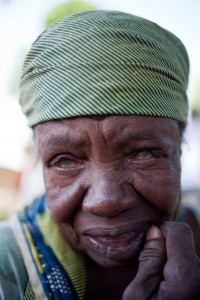 Tony: When you are working in mobile eye clinics (in East Africa we used to call them “eye safaris”) you can experience very difficult situations with individuals that will impact your whole life. For me this happened in March 1987, soon after I moved back to my area, when I participated in my first eye safari. As a young ophthalmologist, it was impressive, coming from the capital to the rural area and going to the villages. On this first eye safari, I saw hundreds of patients. Forty-six of them were completely blind, so I had to determine the causes of the blindness. About 56%, or 26 of them, were blinded by onchocerciasis. I was shocked, because as an ophthalmologist, I could not do anything for them.
Tony: When you are working in mobile eye clinics (in East Africa we used to call them “eye safaris”) you can experience very difficult situations with individuals that will impact your whole life. For me this happened in March 1987, soon after I moved back to my area, when I participated in my first eye safari. As a young ophthalmologist, it was impressive, coming from the capital to the rural area and going to the villages. On this first eye safari, I saw hundreds of patients. Forty-six of them were completely blind, so I had to determine the causes of the blindness. About 56%, or 26 of them, were blinded by onchocerciasis. I was shocked, because as an ophthalmologist, I could not do anything for them.
David: You could not cure them.
Tony: Exactly! And that was before we knew about ivermectin. I asked myself, “So what am I going to do here?” It went on like this. One year later, I visited the Dingila area, alongside the Uele river. There, I saw 60 blind people, 40 of them due to onchocerciasis. One young man, 24 years old, a fisherman, was completely blind and it was irreversible. When I saw him, his expectation was that I could help him, but I said, “No, I cannot.” Then he said, “If you cannot help me, I’m going to go back home and kill myself. I don’t have any reason to live in this world.” I was powerless. I knew I had to do something for this community instead of just focusing on individual cases. Later that same year, we heard about the drug ivermectin, and I knew we could begin to address the problem for future generations through mass drug administration.
David: So your very personal encounter with the young fisherman motivated you deeply to do something to help the whole population. I can feel that this story is still alive inside you.
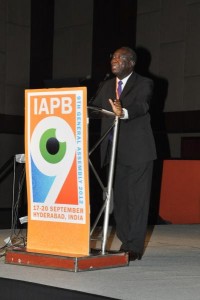 Tony: It is indeed. That is why in my third chapter I’m going to focus on both individuals and communities. I have two big dreams. My first is to coach and mentor young doctors in areas that are endemic for neglected tropical diseases. Second, I want to develop an eye center that can help people in abandoned areas: northeastern Congo, northwestern Uganda, and the southern part of South Sudan.
Tony: It is indeed. That is why in my third chapter I’m going to focus on both individuals and communities. I have two big dreams. My first is to coach and mentor young doctors in areas that are endemic for neglected tropical diseases. Second, I want to develop an eye center that can help people in abandoned areas: northeastern Congo, northwestern Uganda, and the southern part of South Sudan.
David: Two big dreams, that’s beautiful. What would you say about the role of compassion in global health work, in the work that you’ve done? How has compassion influenced the choices you’ve made and how you do your work?
Tony: Jesus healed people who were blind and handicapped. As an ophthalmologist, this is my ministry. If Christ can enable me to carry on, I will follow in his footsteps. Jesus showed the perfect way of living, and if we can follow this, we will have a big impact in the world today.
David: What was it that awakened that sense of compassion in you?
Tony: It’s a very difficult question. I think it’s the way I grew up. I was very privileged because I grew up in a Christian family. I was taught about compassion at a young age, and it really helped me to develop my behavior and the way I see the world. Without that background I don’t know whether I would have been in a position to see things through a compassionate lens. I’m going back home, happy for this third chapter. Things are clear for me.
David: What message would you like to give to the next generation of these doctors and others that you’ll be mentoring when you return?
Tony: I would tell them to consider what they can achieve as an opportunity, and ask God, what do you want of me? If you try and do it by yourself, I think it’s very difficult. Just stop, listen quietly, and really look for what God wants you to do. The biggest challenge for the young doctors now coming on board is that they want to make money quickly. I hope we can change that way of thinking, because that’s not why we are here.
Also, we want to open an opportunity for those who live in the very privileged world to come and help us. Because health care workers in my area want just a bit of support to learn how to do things properly. In public health we have a lot of opportunities. We need those who have the tools, the money, whatever, to come and help us do it.
David: Professor Ade Lucas says that global health is about bringing global solutions to local problems. Now you’re bringing your wisdom and experience from a career at the global level back to a local area.
Tony: I’m not a Ugandan, but people on the Uganda side are the same as my people on the Congo side. Those in the southern part of South Sudan are also the same people. My ancestors migrated from South Sudan. Some of them went to Congo beside the lake, others to Uganda beside the lake, others to Kenya beside the lake, and some went as far as Tanzania. I remember one time when I was traveling in South Sudan, where I went to visit what is called the Shilluk tribe. I saw the people there, I saw their faces. They were eating fish just like I do, and it was exciting. I wanted to do something in that area, which is close to Arua, Uganda. I already have a Ugandan ophthalmologist colleague who is based in Arua. From there, I can easily get in touch with people from South Sudan. If we can work as a team together it would be marvelous. I think people in that corner of the world would benefit from good eye care. Anyway, it’s a dream – I will be there.
David: Tony, thank you for sharing your story with me. I’m excited about this next chapter of your life. And congratulations on receiving the 2016 Mectizan Award for your many years of service and leadership.
Tony: Yes, thank you. We will be in touch.
Dr. Tony Ukety is a pioneer in the prevention of river blindness, also known as onchocerciasis. He began his career as a clinical ophthalmologist in Nyankunde, Democratic Republic of the Congo (DRC), where he discovered that onchocerciasis was a major public health problem in that area. When Merck & Co. donated the drug Mectizan to treat and prevent onchocerciasis, Tony created what has become a highly successful program in DRC, despite years of civil conflict. For many years, Dr. Ukety served as the Non-Governmental Development Organization Coordinator for Onchocerciasis Control at the World Health Organization in Geneva, where he championed global partnerships to successfully control onchocerciasis in Africa and to set the stage for its elimination.

